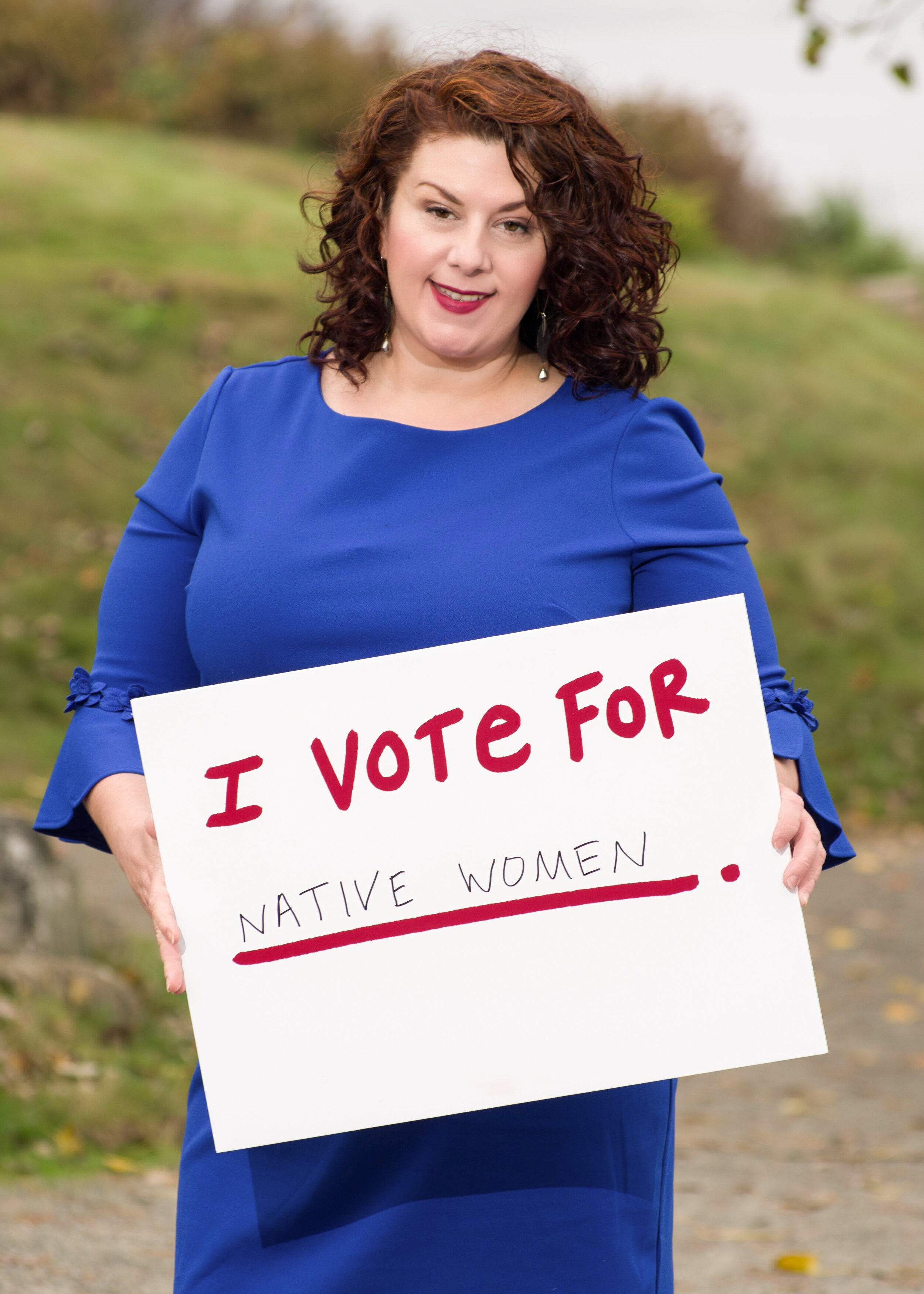Native Women Vote
Native aunties, daughters, grandmas, mothers, nieces, cousins, sisters - we call on you to join us in voting this November. We have the power as Native voters to make a significant difference in state, local, and important national races. Every day, decisions are being made that impact our sovereignty, the welfare of our children, and our access to education and clean water. These decisions affect us all. Now more than ever it is critical Native women are engaged in the decision making process. It’s time to come together as a community and make our presence felt in the 2020 General Election. We vote not just for ourselves, but for those who came before us, and for the next seven generations. Voting is sacred.
Our Outreach Team
Native Action Network is hosting an outreach initiative to increase voter education, registration, and civic participation. For Fall 2020, Native Action Network is working with a team of trusted messengers in Washington to:
assist with American Indian and Alaska Native voter registration
encourage people to vote in the 2020 General Election
build a lasting culture of voter engagement within our community
provide nonpartisan civic engagement and education sessions
inform citizens of their voting rights
Julia Wilson-Peltier
“I vote because I believe in reclaiming our voice as Indigenous peoples to this land. I vote because we deserve leaders who respects tribal sovereignty, the well-being of mother earth, democracy, access to quality healthcare, and health and racial equity for historically oppressed groups. I vote because I know my ancestors before me fought very hard to make sure we have a voice in the U.S. political system, I have an obligation to make sure my voice will be heard and my vote will be counted.”
Brandi Douglas
“We know that we have a voice today. A presence. A permanence in this Nation that was planted by our ancestors so very many years ago, and that we have the duty of nourishing for generations to come. And so I vote to remind us all that we are etched in this landscape. That we, the original inhabitants, are a necessary voice in deciding who gets the honor of representing us in various levels of government, and most importantly, that we aren't going anywhere.”
Breanna Foulkes
“As an Indigenous woman, I have often been over looked and silenced regarding my voice, so being able to vote in tribal and national elections is one important way to get back a part of me that was once lost. Through my eyes being able to exercise a right we have not always had as women is also a form of paying respect to my ancestors. Each and every election matters, each and every voice matters.”
Native Vote Artwork
Native Action Network commissioned Indigenous artists to create custom designs for our Native Women Vote campaign. These designs are free to download and share for non-commercial purposes. You can also shop Native vote designs in our online Bonfire store.
Native Action Network’s Voter Guide
Below find key dates, resources, and information for voters in Washington State.
Mark Your Calendars
October 16 - Ballots start being mailed out and Accessible Voting Units (AVUs) are available at voting centers.
October 26 - Last day to register online or by mail. If you miss the deadline, you can still register to vote in person during business hours up until 8:00 p.m. on Election Day.
November 3 - Election Day! Mail your ballot back to your county elections office postmarked on time or drop it into a local drop box no later than 8 p.m. on November 3.
Important Resources
Register to Vote Online: votewa.gov
Register by Mail: sos.wa.gov/_assets/elections/vrf_print_2020_english.pdf
Election Information and Guides: sos.wa.gov/elections
Voter Hotline: (800) 448-4881
National Voting Information: nativesvote2020.com
Frequently Asked Questions
Am I eligible to vote in Washington State?
To register to vote in the state of Washington, you must be:
a citizen of the United States
a legal resident of Washington state for at least 30 days prior to election day
at least 18 years old by election day
not disqualified from voting due to a court order
not under Department of Corrections supervision for a Washington felony conviction
How do I register to vote?
There are three ways to register:
Online: You can register online, 24 hours a day, at the Washington Secretary of State’s website.
By mail: Download and print a voter registration form and mail it to your County’s elections office. Forms are available in many languages.
In-person: You can register to vote in-person at a Voting Center near you or your County’s Elections Department. Login to VoteWA.gov and select ‘Drop Boxes and Voting Center Locations’ to find a map of nearby centers.
How do I know if I am already registered?
Roughly 60% of registration applications submitted are from people who are already registered, but who either forget that they are registered, or need to update their address. The Office of the Secretary of State offers an online portal at VoteWA.gov that allows voters to confirm whether they are already registered. VoteWA also allows voters to update an address if they moved within the same county, or submit a new registration if moving outside the county. Your registration may become inactive if your mailed ballot is returned as undeliverable, and registrations are canceled if they remain inactive for two consecutive federal general elections - simply register again if you are unsure if your registration is active. If you submit duplicate registrations, the State will update their records and use the voter information on the most recent form.
Do you need an ID to register to vote in Washington?
No, you do not need an ID to vote depending on how you register. You need a current Washington State driver’s license or a current Washington State ID card to register online. However, if registering by mail or in person, you can use a current Washington State driver’s license, a current Washington State ID card, or your Social Security number.
You can still register and vote in person if you do not have one of the above forms of identification or an ID. You will just be required to provide one of the following items instead of a valid photo ID before you cast your ballot:
Valid tribal ID of a federally recognized Indian tribe in Washington State
Copy of a current utility bill
Current bank statement
Copy of a current government check
Copy of a current paycheck
A government document that shows both your name and address
It’s important that you provide one of the above items before or at the time of voting; if you do not, your ballot will not be counted.
How is Covid-19 impacting Washington’s election? How do I vote now?
No one should have to choose between their health and their right to vote. With the Covid-19 crisis, we recommend casting your vote from the safety of your own home with Washington’s secure and convenient vote-by-mail system. All registered voters automatically receive a ballot in the mail before each election. Fill it out and return by mail (no postage required), or place it in a designated Drop Box by November 3.
If you miss the online or mail registration deadline on October 26, or didn’t get your ballot in the mail, you can still register and cast your vote at an in-person voting center before 8 p.m. on November 3. Be sure to wear a mask, stay six feet apart in line, and bring hand sanitizer. Some centers are also providing curbside service. Login to VoteWA.gov to view a list or a map of drop boxes and voting centers in your area, or google voting centers near your zip code.
Can I use a PO Box for my residential address?
No, post office boxes may not be used as a residential address. You can use your PO box for your ballot mailing address though, which does not need to be the same as your residential address, and can be anywhere in the world. If you do not have a permanent residential street address you can use to register, you can use any address where you stay most of the time. Find more information below on the Address Confidentiality Program, or how to register to vote if you are experiencing homelessness.
If I’m on vacation or have moved, will my ballot be forwarded?
Some counties may allow ballots to be forwarded. However, the best thing to do if you know you’ll be gone when ballots are mailed (October 16-26) is contact your county elections department and ask for a temporary change in your mailing address while you are on vacation. You should also contact the county elections department when you return to the address where you are registered to vote.
If you have permanently moved, update your registration with your new address easily online at VoteWA.gov.
How do I obtain a replacement ballot?
You can request a replacement ballot online by logging into VoteWA.gov. Alternatively, a replacement ballot may be obtained by contacting your local county elections department when you have destroyed, spoiled, lost, or not received the original ballot.
How do I get a Voter’s Guide with information about what is on the ballot?
A Voter’s Pamphlet will be mailed to the same address as your ballot. You can also find the Voters’ Pamphlet online in PDF, Text, and Audio formats, in Spanish, Chinese, or Vietnamese. Go to the results page at sos.wa.gov, select your desired election year, and click on the "Voters' Guide" link to see all your options.
I’m a student in Washington for only part of the year, can I still vote?
As a student, you probably change your address more frequently than the average voter. Remember to update your voter registration every time you move. You can update your address online with VoteWA.gov, by mail, or in person. You may register to vote in Washington if you have lived in the state for at least 30 days and have established a residential address in the state. Please note that Washington State residency requirements for voting are not the same as residency for in-state tuition purposes. You may vote in only one state. If you were previously registered in another state, cancel your registration in that state when you register in Washington.
What services are available to voters living with disabilities?
As a voter with a disability, you can request a reasonable accommodation or assistance to vote. The Office of the Secretary of State is committed to ensuring accessibility at voting centers, and that you have the opportunity to vote privately and independently.
Accessible formats of the voters' pamphlet are available online. If you wish to join the subscription list to receive a copy of the Voters' Pamphlet on USB drive, please contact the voter hotline at (800) 448-4881 or email voterspamphlet@sos.wa.gov. Accessible voting units (AVUs) are available at some voting centers until 8 p.m. on Election Day. Learn more about accessible voting online.
Can I still vote if I was convicted of a felony?
If you were convicted of a felony in a Washington State court, your right to vote is restored automatically once you are no longer under the authority of the Department of Corrections (either in prison or on community custody). If you have questions about your status, call (800) 430-9674. If you were convicted of a felony in another state or in federal court, your right to vote is restored automatically as long as you are not currently incarcerated for that felony. You do not lose the right to vote for a misdemeanor conviction or a conviction in juvenile court. In order to vote once your right is restored, you must register, even if you were previously registered.
Will my personal information be made public if I register to vote?
Generally, your name, address, gender, and date of birth will be public information. There is an Address Confidentiality Program (ACP) which assists certain crime victims (specifically victims of domestic violence, sexual assault, trafficking and stalking, and certain criminal justice employees who have been targets of felony harassment on the job or due to the job) who have relocated to avoid further abuse. Information about this program can be found at www.sos.wa.gov/acp.
I am experiencing homelessness or don’t have a permanent address. Can I vote?
Yes, you can vote! You can register by providing a physical location where you spend most of your time, and a valid mailing address. You can use the address or cross-streets of a shelter, park, vehicle, intersection or other identifiable location that you consider your current residence if you do not have a traditional residential address. This location will be used to determine which precinct you will vote in. Along with your residential address, you must also provide a valid mailing address. You need a mailing address in order to receive your ballot and election information on time. You could use a post office box, the address of a friend or relative, shelter, day center, other location where you can get mail, or general delivery at a local post office.




















